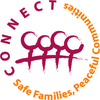How Faith Leaders and Communities can Commemorate Domestic Violence Awareness Month

October is Domestic Violence Awareness Month
At CONNECT we provide education, training, and support about the root causes, consequences and complex dynamics of domestic violence (DV) throughout the year. Each October, we participate in Domestic Violence Awareness month. We are excited to share some ideas with you on how your faith can commemorate Domestic Violence Awareness within your faith community. CONNECT Faith is here as a resource. Please do not hesitate to reach out for collaboration on planning, programming and outreach for your Domestic Violence Awareness Month activities. You can reach me at dwilliams@connectnyc.org.
How Faith Leaders and Communities can Commemorate Domestic Violence Awareness Month
Proclaim
Make a public statement or proclamation declaring domestic violence a moral and spiritual problem and the need for faith communities to prevent it. It’s important for faith communities to see their leaders speak up about the moral imperative to end domestic violence from their specific faith tradition. This can be done at a service, gathering, community event, or congregational print/email blast on DV awareness. Don’t forget to utilize social media to get the message out, as well.
Inspiration for proclamation:
• Domestic Violence We Want Our Churches to be Talking About It– United Methodist Church
Teach, Preach, Share
Teach or preach about domestic violence. Share what your tradition says about domestic violence and leverage the resources within your faith tradition that promote peace, safety, justice and healing for survivors and accountability for those who harm. Utilize sacred stories, prayer, and sing songs of inspiration, peace and healing for survivors and all impacted by domestic violence. You can take this opportunity to challenge underlying attitudes (like sexism), narratives or faith teachings that are manipulated to excuse or justify domestic violence in your faith context. Congregants and devotees look up to their faith leaders to provide guidance in all aspects of life, and faith leaders hold a great deal of influence. Teaching, speaking, or preaching on domestic violence can have a powerful impact on a faith community.
Resources for inspiration on teaching:
• Islam Promotes Healthy Relationships – Peaceful Families Project
• Buddhist Perspective on Domestic Violence – Khmer-Canadian Buddhist Cultural Centre
• 100 Sermons Against Domestic and Sexual Violence – Sojourners Magazine (Christian)
• Jewish Sermons on Domestic Violence – Shalom Bayit
Collaborate with DV organizations for congregational awareness, programming, education and referrals
Addressing domestic violence is a communal effort rooted in collaboration. New York has a variety of community-based organizations that specialize in addressing domestic violence in our diverse communities. Feel free to reach out to these organizations and invite them to speak, participate on a panel, share information or attend one of your congregational events on Domestic Violence in person or on zoom. As you speak up on domestic violence, members may disclose or seek assistance. Be prepared! It’s important to reach out to local DV orgs for assistance, and make referrals. Please see the attached list of DV resources, including CONNECT Faith, that you can reach out to speak, educate or provide information to your faith community. I am also available to help you think through planning ideas for commemorating DV Awareness month in your congregation.
Share information on where to seek help with your congregation
Provide a resource list of phone numbers congregants can call if they are experiencing abuse and want to seek help. It can be placed on handouts to everyone, in the bulletin, or even posted on the walls in the bathrooms. It can be emailed out, or posted on social media or the congregation website. Share information to create awareness about the problem of domestic violence, and information that helps to prevent it. This information can also be a social media campaign. Please see the NYC Resource list attached for information sharing.
Organize programming for everyone
DV impacts everyone in our communities: women, men, children, teens, seniors, the disabled, LGBTQ and more. Create opportunities for dialogue, awareness or education with all impacted groups in your congregation. For example, you can host a panel or a discussion with teens about healthy relationships or teen dating violence, an awareness panel on elder abuse, a dialogues or panels for men’s groups to explore the role they play in ending DV or having a space to share the harm they have experienced. You can also conduct special healing liturgies/service/rituals for all those affected by intimate violence including adults who may have witnessed DV in their childhood, people who have lost friends or supported friends seeking safety, etc. as well as survivors. Everyone is impacted, and healing is also a community effort, so it’s important to engage everyone.
Rituals for inspiration:
• Ardass to remember victims of Domestic Violence – Sikh Family Center
Commit to being a safe faith community
Make a public commitment to take your faith community on a journey to creating safe faith communities by committing to receiving training to prevent and address domestic violence, engage in critical self-reflection of teaching or theologies that are roadblocks or resources for preventing domestic violence. CONNECT Faith is here to assist your faith community on this journey, as well as other organizations listed in the resources guide.
